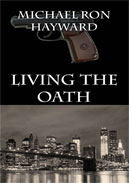
 |
Domenico arrives in America from Italy just before WWII, masquerading as his brother in order to escape the police. He continues his criminal life in New York, stealing for himself and his family. Caught, Domenico spends years in jail and is mentored by a mob boss, Don. Don teaches Domenico to channel his passions and to win battles with his brains more than his brawn. In a ritual conducted once he's out of prison, Domenico takes an oath to become a "made man," then, over several years, moves up the mob's Family hierarchy until a rival almost kills him in a fight to replace him. Domenico returns to prison repentant. Released to his son and granddaughter's new home in Iowa, he vows to be a positive influence on his great-grandson, Pauli. Domenico advises Pauli to form a loyal "gang" of friends to do good, not evil. Pauli's group, The Italians, joins forces with town citizens to raise funds for their school cafeteria lady's medical bills.
Opening with questions about the people behind mobster personas casts the novel in a philosophical and ethical light. The book answers its questions in two distinct parts. In the first part, a backdrop of poverty and prejudice against Italians shows the author's research and suggests realistic motives for the characters' actions. Domenico and his family flee war and dire economic conditions as sharecroppers in Italy. They make money in America the way they learned to do back home: under the table. Like any skill, Domenico gets good the more he practices thievery and underhanded tactics. His mentor, Don, ups the ante, enculturating Domenico in the ancient art of war as well as the fine arts. From the book's perspective, with its objective third-person narrator, Domenico overcomes trials as a success and a hero, even if illegally.
The novel's riveting, action-packed pace solidifies the case in favor of mobsters as people, using the tools available to them to respond to forces beyond their control, just like everyone else. Intrigue and detail pick up toward the end of the first half, as Domenico is lured into a revenge plot. This suspenseful, complex drama elicits compassion for Domenico and the characters who sacrifice in loyalty to him. These mobsters become the good guys, worthy of sympathy over and against enemies who want to undo the Family's rules against drug dealing. The introduction of drugs and violence makes Domenico seem innocent, the victim of worse evils. The book picks up themes developed in movies like The Central Park Five and Gangs of New York of systemic corruption and bias that shed new light on gangs.
The second half's new generation of characters parallels the first half's. Pauli, spending his senior year in a new town far from New York, mirrors young Domenico, adrift in a new country. Pauli isn't poor, however. His mom's promotion affords them a nice house in suburbia. Pauli's "problem" is more a challenge: how much charity he can muster for a woman to whom he has little connection. The loyalty in the first half, based on shared suffering and an oath, becomes a means of sharing wealth and goodwill in the second half. A novel that starts out exonerating mobsters through fraught relationships concludes with a band of exemplary teenagers. From the beginning to the end, the book plumbs the surprising and positive outcomes of mob involvement.
RECOMMENDED by the US Review